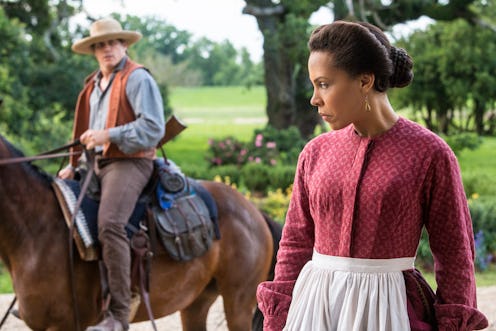
When I first heard about WGN America's new series Underground, about a group of runaway slaves and the various people they encounter in Antebellum Georgia, I was thrilled. This is a fascinating aspect of American history that we rarely see told on screen. Plus, what we can learn from Underground goes beyond the history books, according to Amirah Vann, who plays Ernestine.
History tends to go flat with time, and dramas such as Underground with complicated, captivating characters like Ernestine as well shocking twists and turns can definitely help to bring the old back to life. "It's so well-written," says Vann, "and my character in particular, the female characters actually in general, are just so well [written] — you get the full human being. They really kind of excavate all the different parts of our personality and of humanity too, being able to investigate my sexuality, my strength, my vulnerability."
But the show isn't exploitative or meant to depress. It's an exploration of slavery, which went on in this country for over a century, from a new perspective."We're not talking about the occupation," she explains. "It's talking about how this group of enslaved people, despite the horrific atrocities, still found ways to organize and to love and to fight for their rights." That's what Vann thinks makes the series so thrilling, the way it challenges misconceptions about the era and forces viewers to reinvestigate what we think we know.
We all assume 'oh I know about the Underground Railroad' but how much is actually written in history books? I think often it's not elaborated. We hear about Harriet Tubman, but how much more? Because [Underground] is a series it gets to really get into all the other narratives, and there's so many narratives.
Watching the series, I can't help but realize that my main frame of reference for the Underground Railroad is children's books. Whenever the runaways talk about "following the drinking gourd," my mind leaps to sitting on the floor for story time or watching Reading Rainbow. Isn't that absurd? I'm so glad that this series exists now and gets to dig into the nuances of that time period that are decidedly not for little kids.
Plus, the stories we're seeing on Underground can help motivate us to fight injustice today and look past those who try to undermine situations with misdirection and an "us versus them" attitude too, according to Vann. "It's so easy to be pitted against each other, and those tactics that were used then we used all through the Civil Rights movement and continue to be used today." The show's use of modern music helps to emphasize the importance of investigating this corner of history and how it has affected the present as well.
"Hopefully this generation says 'oh, that's the legacy I come from,'" says Vann. "From people who actually survived disasters. Who were intuitive. Who were organized and who looked out for each other. You know what I mean? It's the first integrated Civil Rights movement. I think it's very important for the black culture to understand that's who we come from, but ... before Civil Rights, we had already done this where we came together as a nation against the injustice that was slavery. The institution of slavery."
Ernestine is surviving in her own way. The entire series is about survivors, whether that turns them into a hero or a villain in the audience's eyes. Of course, as Vann points out, importance aside, Underground is still a drama that's meant to entertain. "I love the conversations that come out of it," she says, "but at the end of the day, it is a TV show."
Images: WGN America (2)